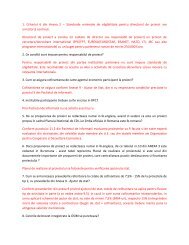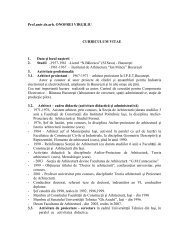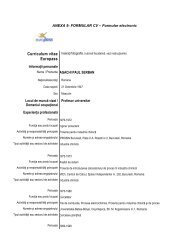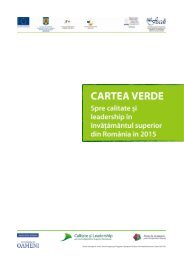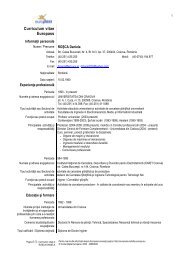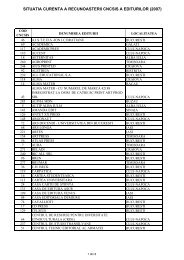Modul de formare-Managementul resurselor financiare - uefiscdi
Modul de formare-Managementul resurselor financiare - uefiscdi
Modul de formare-Managementul resurselor financiare - uefiscdi
- No tags were found...
Create successful ePaper yourself
Turn your PDF publications into a flip-book with our unique Google optimized e-Paper software.
Any organization with a<strong>de</strong>quate incomes compared to the needs and the aspirations has a<br />
minimal motivation to engage in risky innovations. In this case, if a university is not authorized<br />
to retain and manage autonomous their own generated revenues, it is not an economic incentive<br />
to supplement the budgetary allocations through the sale of aca<strong>de</strong>mic services. The financial<br />
constraints and opportunities are the key factors of the entrepreneurial activity orientation.<br />
In this respect, the case studies reported in the countries participating in European Universities<br />
for Entrepreneurship - their Role in the Europe of Knowledge (EUEREK) 37 suggest that<br />
severe financial constraints may inhibit creative entrepreneurship because many innovations<br />
require initial investment and some financial risks that institutions with limited resources are not<br />
willing to take. Typically, any additional income arising from research and teaching is cashed<br />
at the university central level and not at the level of university’s faculties, <strong>de</strong>partments or work<br />
teams. Such arrangements do not encourage entrepreneurial behaviour at individual level or<br />
working groups level in the university. Governments can stimulate entrepreneurial behaviour of<br />
universities by the mechanisms used for allocating resources. If they are allocated for the<br />
aca<strong>de</strong>mic services provi<strong>de</strong>d, for the aspirations and achievements in research or for stu<strong>de</strong>nts<br />
recruitment, the higher education institutions are encouraged to be oriented to the specific<br />
market and entrepreneurial behaviour.<br />
The major financial indicators for assessing the potential of the business activities of the<br />
universities are: the source of incomes (public represented by budgetary allocations and private<br />
represented by for their own incomes), the mechanisms by which incomes are received, the<br />
procedures for allocating resources within the institutions.<br />
The entrepreneurship dimension in universities can be measured by their entrepreneurial<br />
behaviour. Five different categories of entrepreneurial behaviour can be observed in the<br />
EUEREK project<br />
- private universities that have the advantage of the new entrants into higher education (English<br />
universities have private profile and are similar to the U.S. universities where governing<br />
organisms are similar to corporate management boards);<br />
- institutions highly involved in terms of entrepreneurship stimulated by government initiatives;<br />
- major in<strong>de</strong>pen<strong>de</strong>nt institutions involved from the entrepreneurial perspective but not directly<br />
stimulated by government initiatives;<br />
- small <strong>de</strong>partments, faculties and research centres;<br />
- education with the help of associate teaching staff, research and counselling by involving each<br />
individual aca<strong>de</strong>mic staff.<br />
In 2004, the institutional case studies had very different income profiles. Budget income<br />
reached rates of 70% in universities in Finland, Poland, Spain to 0% in private universities from<br />
Moldova, Poland, Spain and UK. Study fees are complementary to state budget funding in these<br />
extreme cases ranging from over 90 per cent in the private universities in Poland and Spain to<br />
zero in Finland and Swe<strong>de</strong>n. The percentage of non-government source of income from research<br />
ranges from over 60 per cent in one of the UK (Nottingham) institutions to zero in some<br />
Moldovan and Polish universities. These differences <strong>de</strong>pend on the different legal and political<br />
situation of universities in these countries. For example, in Finland and Swe<strong>de</strong>n the educational<br />
activities of universities are still regar<strong>de</strong>d as a public service and they are not allowed to charge<br />
fees for any of their regular teaching activities, although recent changes in their legal status now<br />
permit universities to charge some fees for courses that are not part of their mainstream<br />
37 European Universities Project for Entrepreneurship - their Role in the Europe of Knowledge is fun<strong>de</strong>d un<strong>de</strong>r the<br />
FP6-CITIZENS, having as coordinator University of London / Institute of Education (UK).The project studied the<br />
activities of European universities and how national funding and planning arrangements affects them. They were<br />
i<strong>de</strong>ntified the steps to improve the effectiveness of universities as producers and transmitters of knowledge.<br />
61




